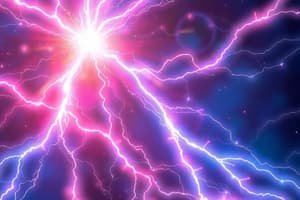Podcast
Questions and Answers
What did James Clerk Maxwell's theory of electromagnetic force describe?
What did James Clerk Maxwell's theory of electromagnetic force describe?
- The chemical reactions of conductive materials in response to electric fields
- The biological effects of electromagnetic radiation on living organisms
- The relationship between electric charge, magnetic fields, and the motion of charged particles (correct)
- The geological forces that shape the Earth's magnetic field
What is the significance of Heinrich Hertz's discovery of radio waves in relation to James Clerk Maxwell's work?
What is the significance of Heinrich Hertz's discovery of radio waves in relation to James Clerk Maxwell's work?
- It confirmed Maxwell's prediction of electromagnetic waves traveling at the speed of light (correct)
- It disproved Maxwell's equations about the relationship between electricity and magnetism
- It led to advancements in quantum mechanics unrelated to electromagnetism
- It introduced a new set of mathematical equations contrary to Maxwell's Equations
How do charged particles like electrons contribute to the functioning of devices such as batteries and transistors?
How do charged particles like electrons contribute to the functioning of devices such as batteries and transistors?
- By emitting electromagnetic radiation that drives device operations
- By creating magnetic fields that power these devices
- By causing chemical reactions that store energy within devices
- By interacting with conductive materials in response to electric fields (correct)
What did Maxwell postulate about the relationship between varying electric fields and magnetic fields?
What did Maxwell postulate about the relationship between varying electric fields and magnetic fields?
What is the focus of studying electricity and magnetism in the subfield of Biophysics?
What is the focus of studying electricity and magnetism in the subfield of Biophysics?
Which statement best describes the impact of electricity and magnetism on society based on the text?
Which statement best describes the impact of electricity and magnetism on society based on the text?
In the context of electricity and magnetism, what is the role of computational and numerical methods?
In the context of electricity and magnetism, what is the role of computational and numerical methods?
How has our understanding of the interaction between charges and materials impacted modern technology?
How has our understanding of the interaction between charges and materials impacted modern technology?
Which type of materials exhibit unique behaviors due to the arrangement of their intrinsic magnetic dipoles?
Which type of materials exhibit unique behaviors due to the arrangement of their intrinsic magnetic dipoles?
What is a significant technological application of magnetic materials mentioned in the text?
What is a significant technological application of magnetic materials mentioned in the text?
Flashcards are hidden until you start studying
Study Notes
Electricity and Magnetism: Exploring Two Pillars of Modern Physics
Electricity and magnetism are intertwined forces that form the foundation of our understanding of the natural world. These fundamentals have shaped modern technology and influenced countless scientific discoveries since their initial exploration in ancient times.
Electromagnetic Forces
In the early 19th century, James Clerk Maxwell synthesized existing knowledge into a coherent theory: the electromagnetic force, governed by mathematical equations known today as Maxwell's Equations. This comprehensive framework described the relationship between electric charge, magnetic fields, and the motion of charged particles.
Maxwell postulated that varying electric fields generate magnetic fields, leading to his prediction of the existence of electromagnetic waves traveling at the speed of light. His hypothesis proved true with Heinrich Hertz's discovery of radio waves and ultimately led to the development of wireless communication.
Charge Transport and Circuits
Charged particles, specifically electrons, flow through conductive materials in response to electric fields, creating devices such as batteries, diodes, and transistors. Understanding the interaction between charges and materials allows us to manipulate electrical systems at scales ranging from household appliances to global communications networks.
Quantum mechanics, a more recent development in understanding charged particles, reveals the counterintuitive yet highly accurate behavior of electrical currents at atomic scales.
Magnetization and Material Properties
Magnetic materials exhibit unique behaviors due to the arrangement of their constituents' intrinsic magnetic dipoles; examples include ferromagnets, ferrites, and superconductors. Their properties enable diverse technological innovations, such as magnetic levitation trains, hard disk drives, and advanced medical imaging.
The mechanisms responsible for these fascinating features remain active subjects of investigation, complementing our basic understanding of electricity and magnetism and inspiring novel uses for these powerful forces.
Research Opportunities
As evidenced by the variety of subfields within this discipline, studying electricity and magnetism encompasses a broad spectrum of research possibilities. From fundamental theories to technologically driven advancements, the pursuit of a deeper understanding of these phenomena continues to fuel curiosity worldwide:
- Computational and Numerical Methods: Developing algorithms and software to simulate complex electromagnetic processes
- Materials Science: Investigating new materials with tailored magnetic and electronic properties
- Optoelectronic Devices: Combining photonic and electronic functionalities in compact devices
- Biophysics: Studying the interactions between biological structures and magnetic fields
These endeavors underscore the profound impact of electricity and magnetism on multiple aspects of society, rendering them inherently multidisciplinary domains of inquiry.
Studying That Suits You
Use AI to generate personalized quizzes and flashcards to suit your learning preferences.




